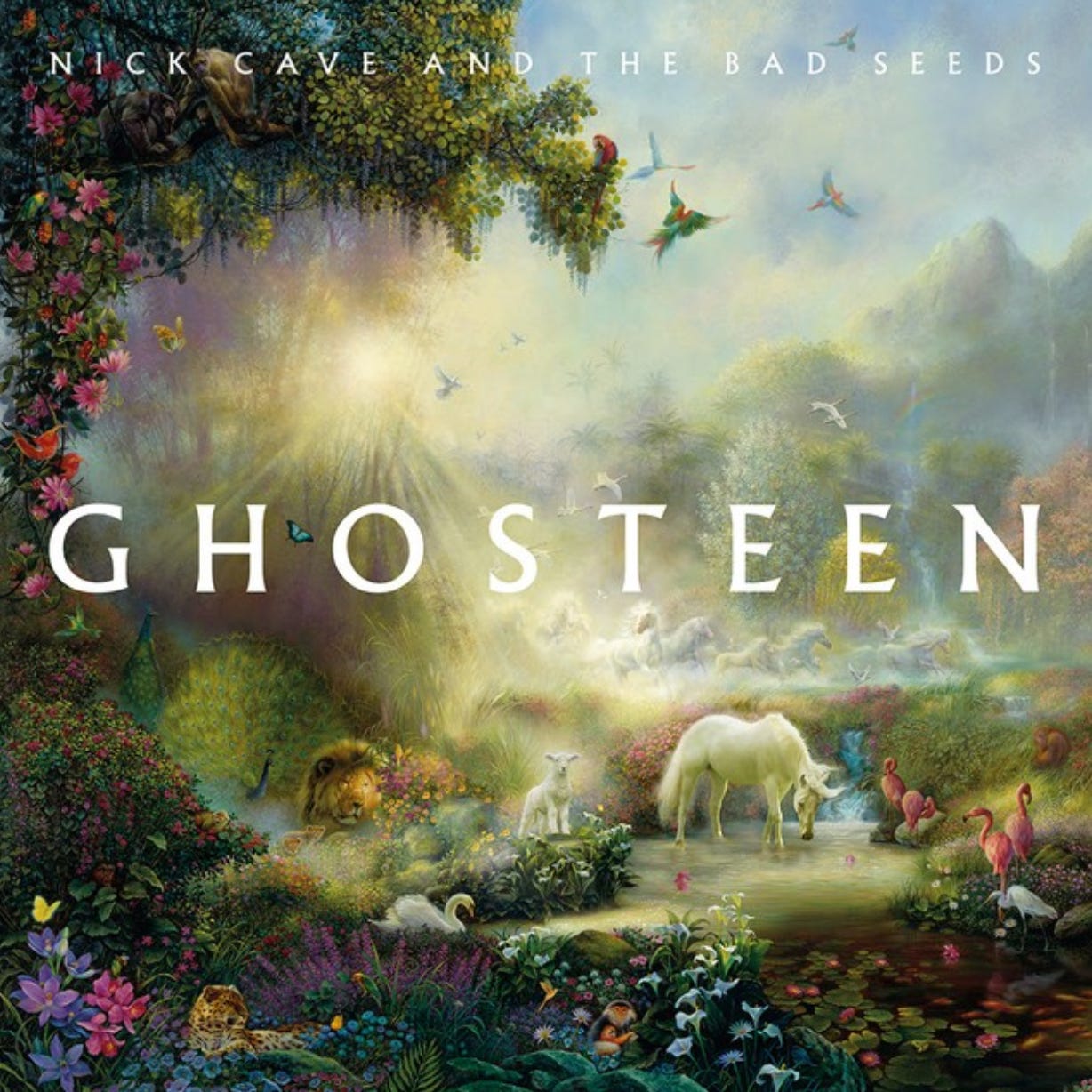
Nick Cave is a long-time musician whose son died at age 15. His last three albums are a public grieving and acceptance of the loss. Ghosteen has a near perfect score according to the music cognoscenti.
“But then, in the album’s final verse, at the close of the dangerous “Hollywood,” he steps back from the edge of a nervous collapse to paraphrase a Buddhist parable in his fractured falsetto: “Kisa had a baby, but the baby died,” he sings. And so begins “The Mustard Seed,” a tale in which a mourning mother, Kisa Gotami, tries to save her baby by asking for seeds from houses where no one has died, as prescribed by the Buddha. Alas, someone has already died in every other house, so Kisa is left to bury her child and manage another home where the specter of death has crept across the threshold. “It’s a long way to go to find peace of mind,” Cave repeats at the end, the bassline’s tension and his wounded tone emphasizing the cold irony of the epiphany. Still, the takeaway is clear: He has not been alone in his sadness, and neither will you when the time comes.” Source
A young woman in despair wrote Nick Cave a message. Here it is, with his reply:
I feel very bad about myself, I cannot see anything positive in my body, I hate to look at myself in the mirror and it makes me suffer a lot. I feel like everyone is better than me, even though I did very important things for being just 16 years old. How should I behave? What should I do for myself? Thank you for the possible answer.
BARBARA, ROME, ITALY
Dear Barbara,
Thank you so much for entrusting me with such a courageous and heartfelt question. I took the liberty of discussing it with a number of my female friends and there was not one among them that was not greatly affected by your honesty and that did not understand exactly what you were talking about. It seems that you are not alone in finding the mirror your enemy, but you are unique in being so open and truthful about your relation to it.
For me, the question took me back to my adolescence and the troubled relationship I had with my own reflected image, and those nightmarish teenage years lived inside the pitiless mirror. I’m afraid to say this constant self-evaluation does not significantly decrease as you grow older, however it does become more manageable. I live mostly in hotels these days, and as I cautiously enter a different bathroom each night, with its angled mirrors and merciless lighting, I stand before the mirror at my most defenceless and exposed, and watch it do its worst. I often wonder how much accumulated misery a hotel mirror contains as it reflects back at us what appears to be our essential self. But, of course, what the mirror projects is not our true self at all but only our reflected outer-shell. What is virtually impossible to see within a mirror is that the very essence of our humanness, our vulnerability and fragility, is the most beautiful thing we possess.
Yet, when we are young that vulnerability can appear to us as shame or weakness, as we attempt to brace ourselves against what we may see as a brutal, unforgiving and judgemental world. But those who have no awareness of their own fragility, who present themselves as overconfident, armoured-up and invulnerable, sacrifice the essence of what makes them both human and beautiful.
Vulnerability is the very thing that permits us to connect with each other, to recognise in others the same discomfort they have with themselves and with their place in the world. Vulnerability is the engine of compassion, and can be a superpower, a special vision that allows us to see the quivering, wounded inner world that most of us possess.
Barbara, I am happy to hear that you have done important things as a 16 year old, because it is often what we do that moves our attention away from what we think we are, or the way that we think we look. The note of pride in your words could be the very thing that escorts you home, where you fall back through the reflected surface of your body, into your authentic self. Your pain-filled question holds great hope because in order to connect meaningfully with the world we need to have some understanding of its innate tragedy. Paradoxically, the fragility of your question is its immense strength and says something very profound about you as a person; something very beautiful shines through its unhappy words. That body that you ‘can’t see anything positive in’ holds within it an unusually courageous, honest and intelligent heart. Your question is a testament to your specialness, and by asking it you have touched us all.
Finally, you asked what you could do, how to behave. Please, take care of yourself. Seek out beautiful things, inspirations, connections and validating friends. Perhaps you could keep a journal and write stuff down. The written word can put to rest many imagined demons. Identify things that concern you in the world and make incremental efforts to remedy them. At all costs, try to cultivate a sense of humour. See things through that courageous heart of yours. Be merciful to yourself. Be kind to yourself. Be kind.
With love, Nick
Another way in which we never die:

Bonus: Still reading Something Deeply Hidden. Did you know that the simplest equation that explains all of reality posits that there are many (many!) copies of you! Well, almost-you? What does this you reading this think about all the other yous?


